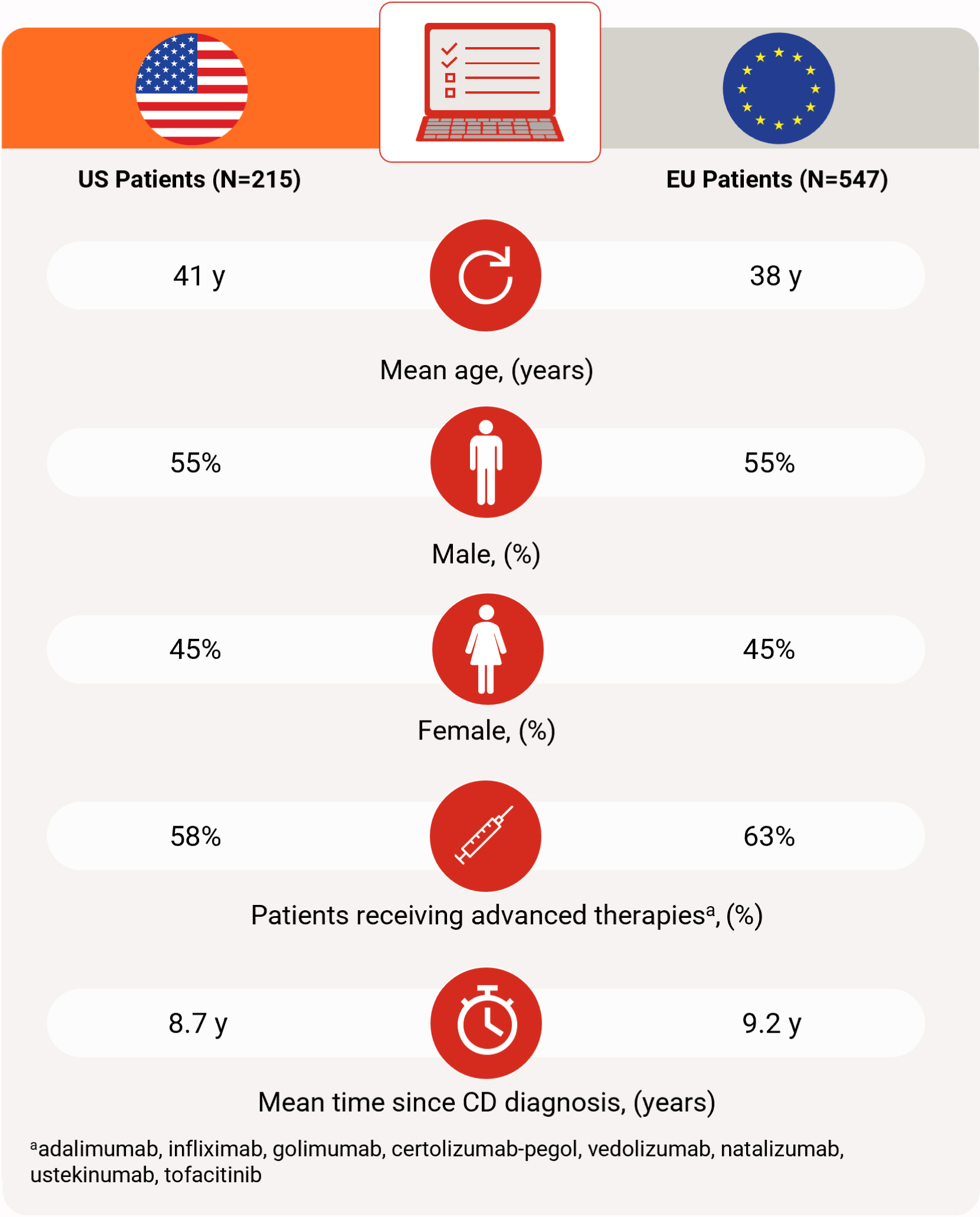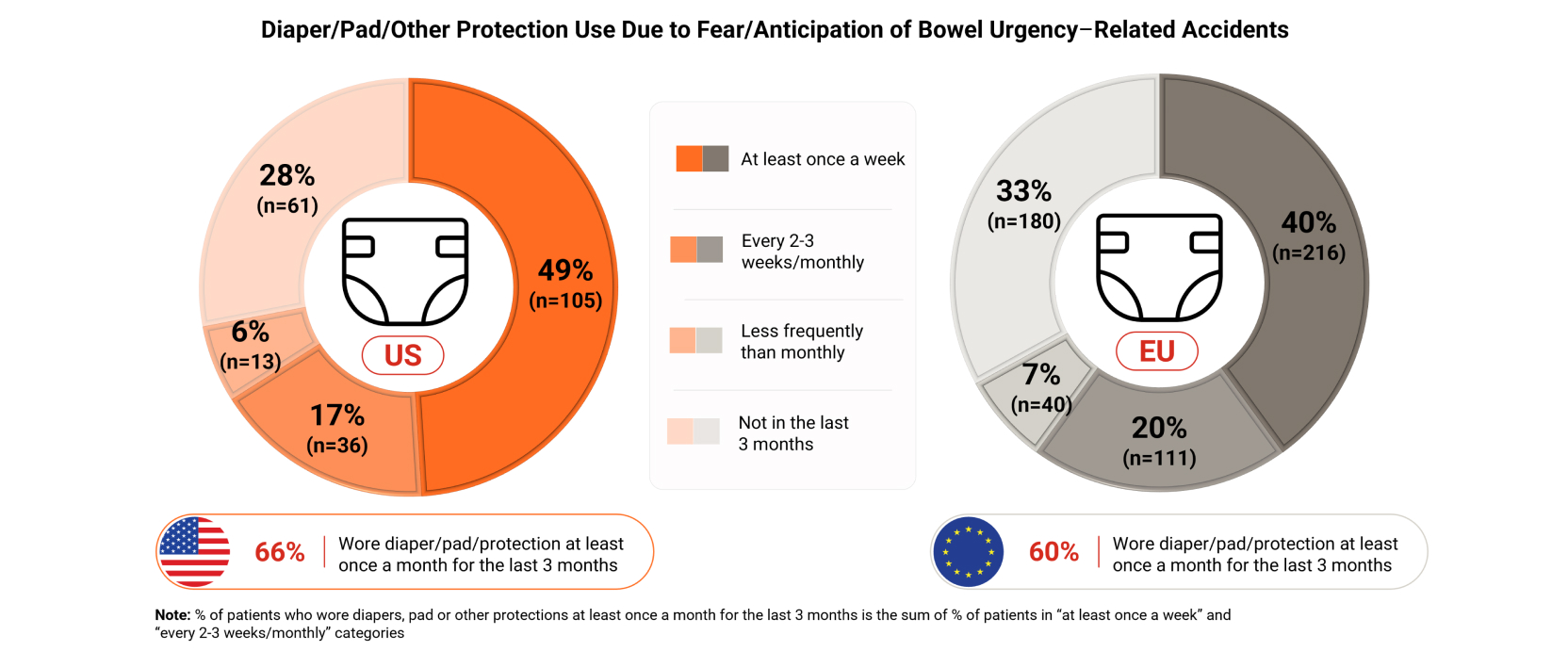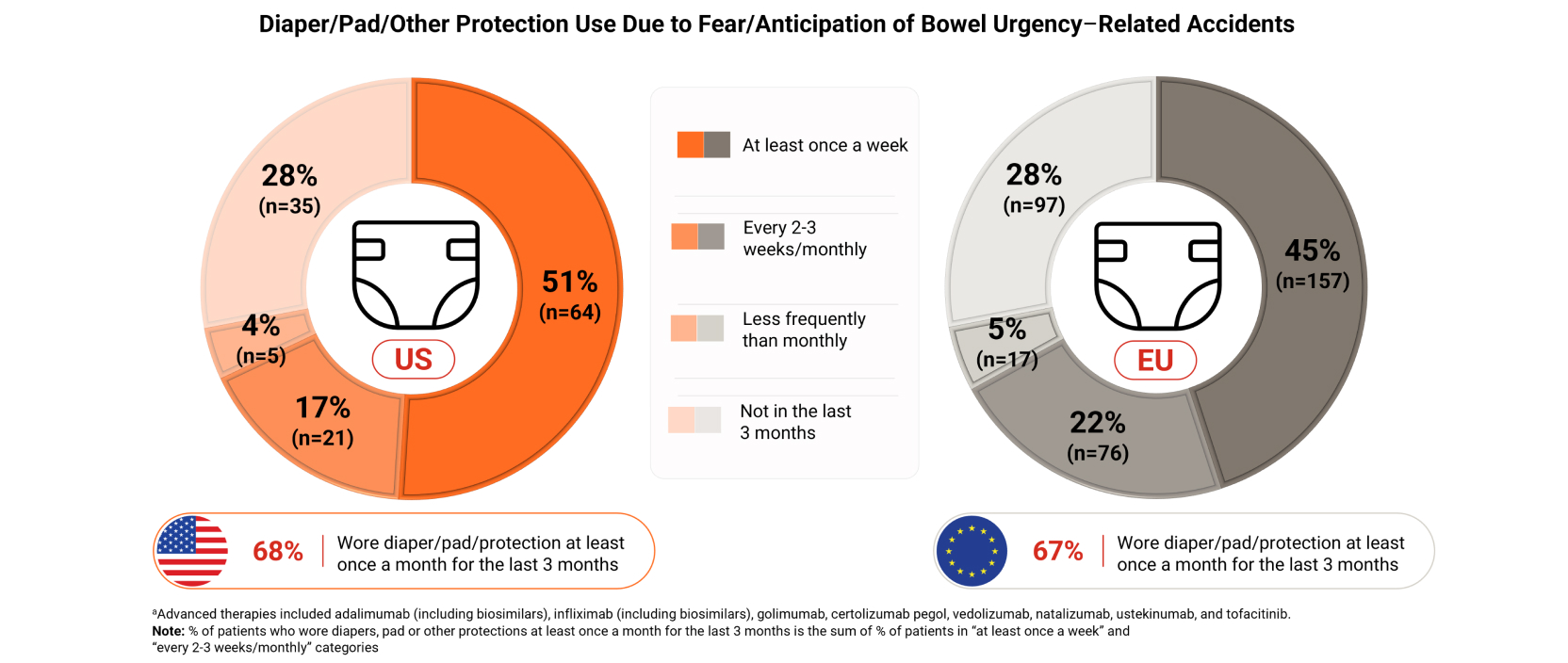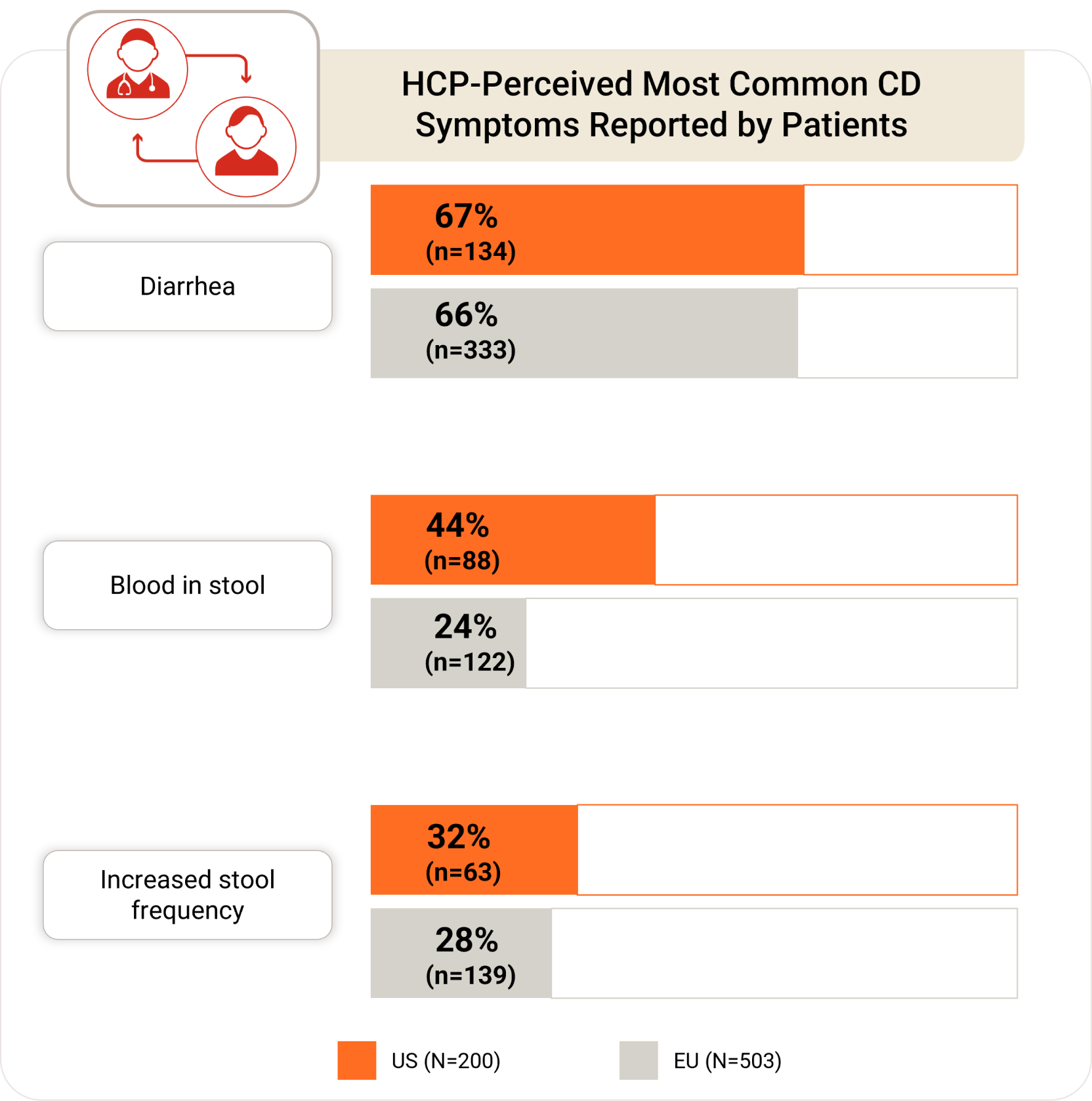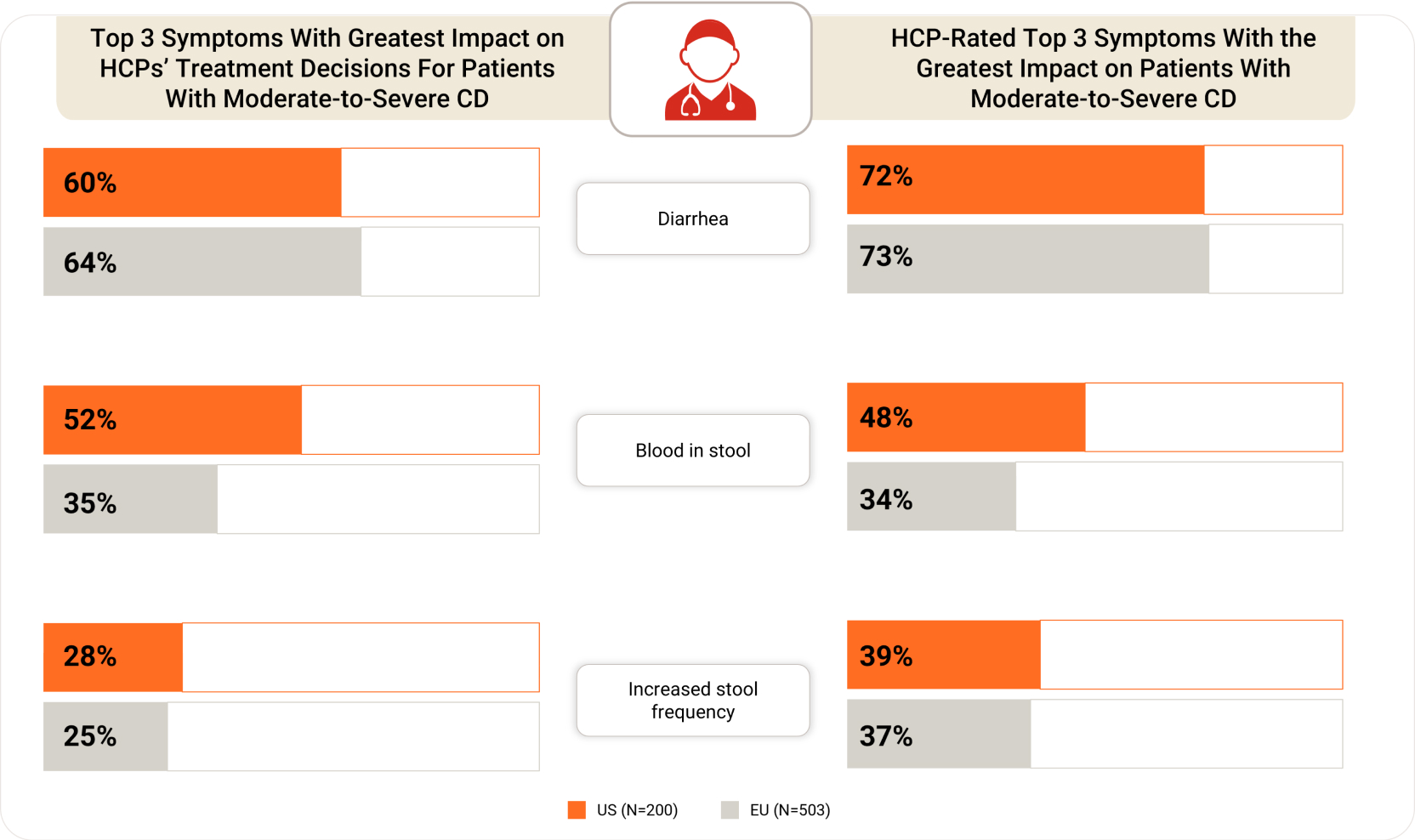The Communicating Needs and Features of IBD Experiences (CONFIDE) Study
Explore the Impact of Crohn’s Disease Symptoms: Insights from the CONFIDE Study
Discover valuable insights into the impact of Crohn’s disease (CD) symptoms on patients’ lives through the Communicating Needs and Features of IBD Experiences (CONFIDE) Study. This research initiative delves into the experiences of patients with moderate-to-severe CD, shedding light on critical aspects such as:
- Patient Demographics and Characteristics: See the baseline demographics for the United States (US) and European (EU) patients that participated in the study
- Key Symptoms: Learn about prevalent CD symptoms, including diarrhea, bowel urgency, and increased stool frequency
- Diapers/Pads/Protection Usage: Understand how patients with CD manage their symptoms by using protective measures due to fear of bowel urgency–related accidents
- Impact on Social Activities and Sexual Function: Explore how CD symptoms influence patients’ participation in social events, work, school, sports, and sexual activity
- Healthcare Provider - Patient Communication: Discover how healthcare providers (HCPs) view symptoms of moderate-to-severe CD and explore communication gaps between HCPs and patients
By bridging the gap between patient experiences and healthcare professionals, the CONFIDE Study aims to enhance patient care and communication.
1. Patient Demographics and Characteristics1,2
2. Key Findings From the CONFIDE US and EU Dataset2
To assess the burden of CD–related symptoms, patients were asked a series of questions that involved selecting from a list of 30 symptoms.3 Diarrhea, bowel urgency, and increased stool frequency were the top 3 most impactful as well as most frequently reported symptoms experienced by patients with moderate-to-severe CD in the US and EU.2
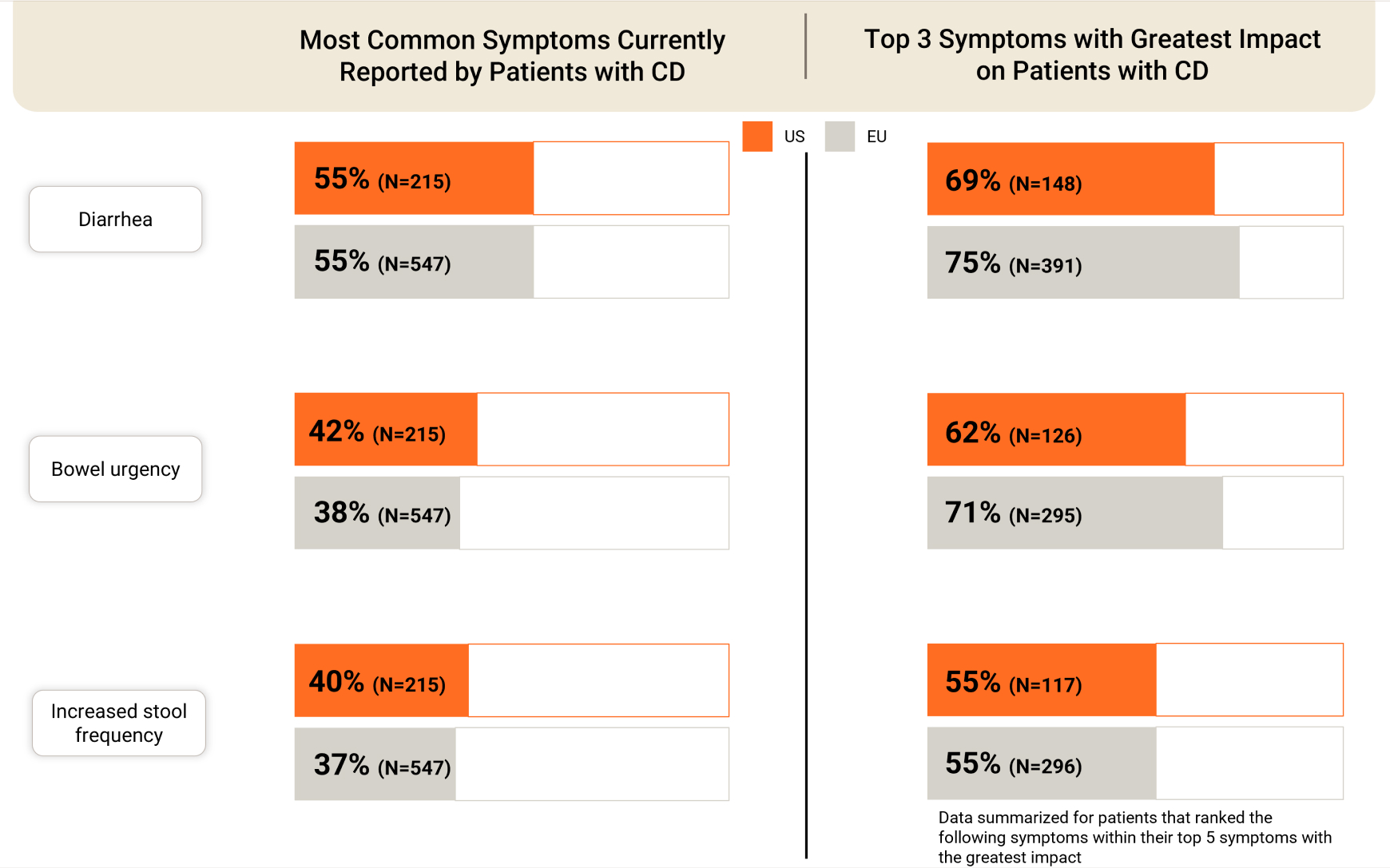
3. Use of diapers, pads or other protection in the last 3 months due to fear/anticipation of bowel urgency-related accidents4
Patients with CD were asked if they had to wear a diaper/pad/other protection due to fear or anticipation of bowel urgency-related accidents in the past 3 months. A large proportion of the patients surveyed (66% in the US and 60% in EU), including those receiving advanced treatments (68% in the US, 67% in EU), disclosed that they had used diapers, pads, or protection at least once a month for the last 3 months due to fear of bowel urgency-related accidents.4
4. Impact of CD Symptoms on work/school life, social life, and ability to participate in sports/physical exercise5
Majority of patients with CD in both the US and EU reported that they declined participation in daily life activities within the last 3 months because of their CD-related symptoms. Bowel urgency and fear of bowel urgency-related accidents were among the top most common CD related reasons for declining participation in social events, sports/physical exercise, and work/school in both US and EU patients.5
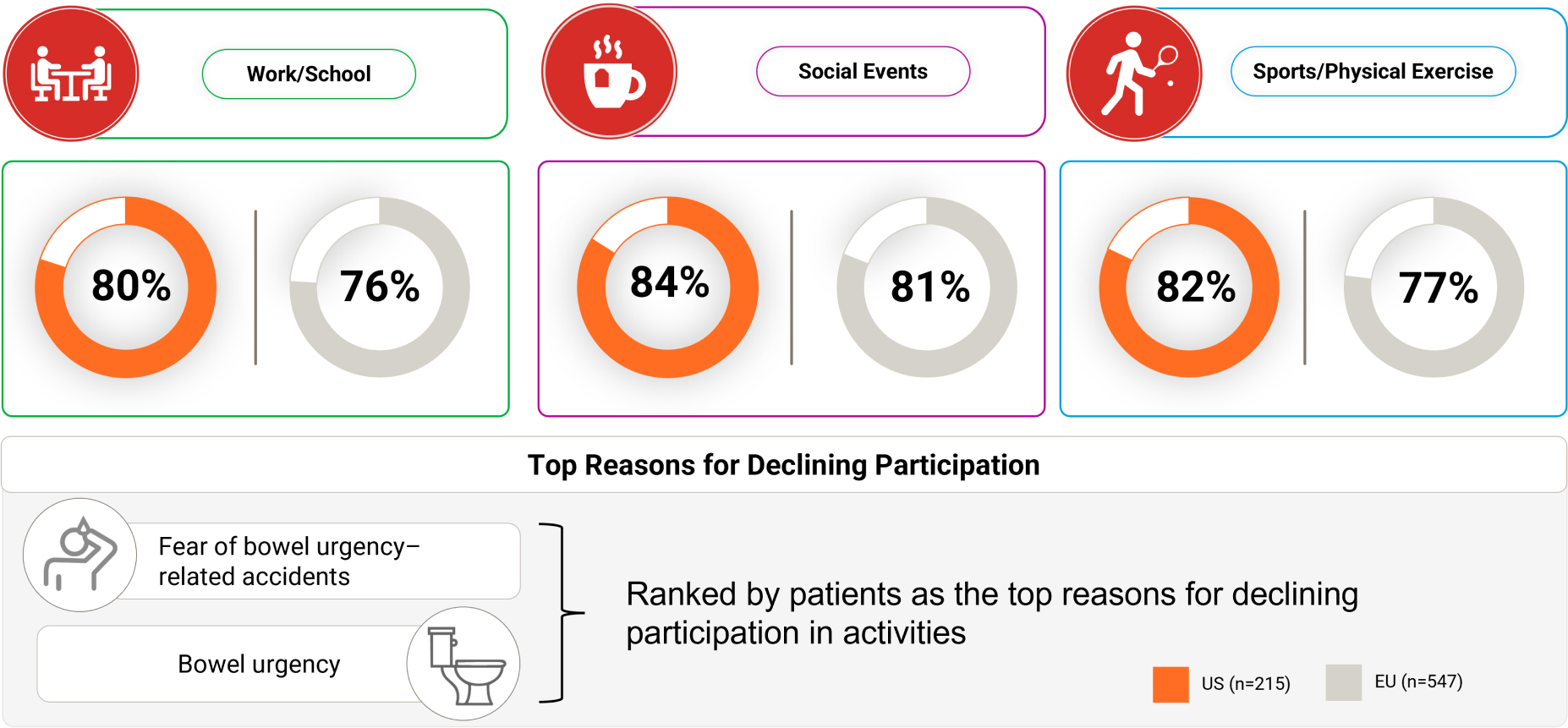
Patients avoiding or decreasing sexual activity due to CD6
Patients were asked if within the last 3 months they had avoided or decreased sexual activity because of CD. More than half of patients with CD opted to either abstain from or reduce sexual activity in the past 3 months.6
Patients Avoiding or Decreasing Sexual Activity Due to CD

Reasons US and EU patients avoided or decreased sexual activity in the last 3 months6
Among patients with CD who decreased or avoided sexual activity in the last 3 months, fear of bowel urgency-related accidents was cited as the top reason. Additional reasons included fear of fecal seepage, tiredness/fatigue, fear of bowel movement accidents, and decreased sexual desire.
5. Explore HCP-Perceived Crohn’s Disease Symptoms and HCP-Patient Communication Gaps: Insights from the CONFIDE Study
Communication Gaps Between HCPs and Patients1


CD=Crohn's Disease; EU=European; HCP=Healthcare Providers; IBD=Inflammatory Bowel Disease; US=United States.
References
- Schreiber S, Gibble TH, Dubinsky MC. Communication Gap between Patients and Health Care Professionals on Bowel Urgency with Focus on Crohns Disease: Results from the Communicating Needs and Features of IBD Experiences (CONFIDE) Survey. Poster presented at the United European Gastroenterology Week - 31st Annual Conference; 14 17 October 2023; Copenhagen, Denmark. Poster PP0880.
- Dubinsky M, Gibble TH, Travis S, et al. Communicating Needs and Features of IBD Experiences (CONFIDE) Survey: Impact of Moderate-to-Severe Crohn’s Disease Symptoms on Health Care Professional Treatment Decisions in the United States and Europe. Poster presented at AIBD; 14 16 December 2023; Orlando, Florida. Poster 25
- Travis S, Potts Bleakman A, Dubinsky MC, et al. The Communicating Needs and Features of IBD Experiences (CONFIDE) Study: US and European Patient and Health Care Professional Perceptions of the Experience and Impact of Symptoms of Moderate-to-Severe Ulcerative Colitis. Inflamm Bowel Dis. 2023; doi: 10.1093/ibd/izad142 (Ahead of print).
- Schreiber S, Gibble TH, Dubinsky MC, et al. S855 Communicating Needs and Features of IBD Experiences (CONFIDE) Survey: Burden and Impact of Bowel Urgency is Similar in Patients With Moderate-to-Severe Crohn’s Disease and Ulcerative Colitis. Am J Gastroenterol. 2023;118(10S): S633-S634.
- Schreiber S, Gibble TH, Dubinsky MC, et al. Communicating Needs and Features of IBD Experiences (CONFIDE) Survey: Burden and Impact of Bowel Urgency is Similar in Patients with Moderate-to-Severe Crohn’s Disease and Ulcerative Colitis. Poster presented at American College of Gastroenterology; 20 25 October 2023; Pancouver, Canada. Poster P-0678.
- Rubin D, Gibble TH, Travis S, et al. Communicating Needs and Features of IBD Experiences (CONFIDE) Survey: United States and European Patient Perspectives on the Impact of Moderate-to-Severe Crohns Disease on Sexual Activity. Poster presented at Advances in Inflammatory Bowel Diseases; 14 16 December 2023; Orlando, Florida. Poster 03.
VV-MED-134811
Please rate your satisfaction with the content on the following statements:
Very Dissatisfied
Dissatisfied
Neutral
Satisfied
Very Satisfied
